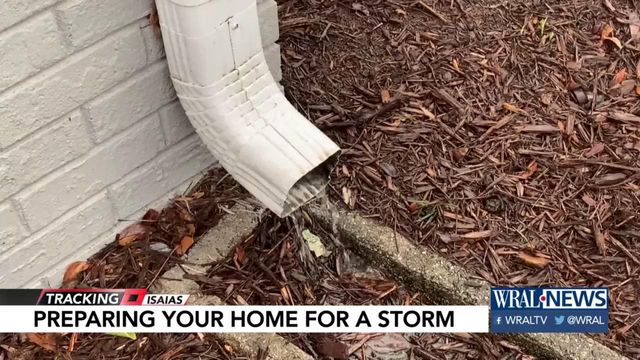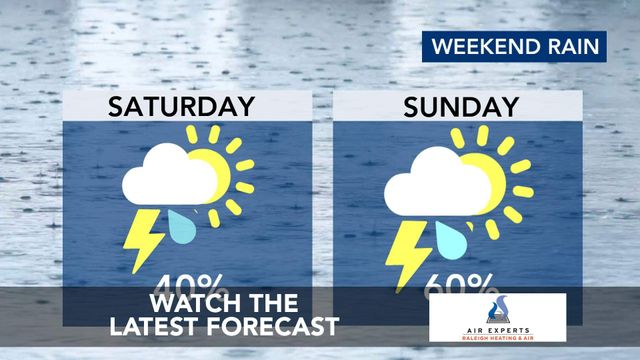Hurricane-proof your NC home: Essential steps to weather the storm
Hurricane season is almost here and with it comes the need to prepare your home in North Carolina.
While homes along the coast tend to be more vulnerable to hurricanes, every North Carolinian should be aware of the damage that high wind, pouring rain and rising water can do.
Here’s a list of things North Carolina homeowners should do to ensure their home is ready for hurricanes and tropical storms.
Deciding whether to evacuate? Listen to local leaders
If leaders are calling for an evacuation, listen to them.
A major hurricane (category 3 or higher on the Saffir-Simpson Hurricane Wind Scale, winds of greater than 111 mph) can cause devastating to catastrophic wind damage and significant loss of life simply due to the strength of their winds.
Hurricanes of all categories can produce deadly storm surge, rain-induced floods and tornadoes.
List out your property items
Before storm season begins, take inventory of your valuable personal items. You will need this list to get insurance settlements, tax deductions or losses.
Be sure to take pictures and describe the items on your list. Put these and other key insurance papers in waterproof containers or in your safety deposit boxes.
Know Your Zone
Know Your Zone is an evacuation system for coastal counties that highlights North Carolina’s areas most vulnerable to impacts from hurricanes, tropical storms and other hazards.
When a storm is approaching, local officials will determine which zones are most at risk and which residents should evacuate. Higher risk areas in Zone A will typically be evacuated first, followed by areas in Zone B, etc. A tiered approach is used in order to help reduce traffic throughout the evacuation period. While all zones won’t be evacuated in every event, emergency managers will work with local media and use other outreach tools to notify residents and visitors of impacted zones and evacuation instructions.
In you live in a coastal community in North Carolina, visit the state’s website to know your zone for your home.
Look over flood insurance policy and coverage
In North Carolina, separate policies are needed for protection against wind and flood damage.
Your local building inspection department has copies of the Flood Insurance Rate Maps that show property subject to a 100-year storm frequency.
Want to check your property’s flood, fire, wind, air or heat factors? Click or tap here
Use storm shutters to protect windows; install high-impact windows throughout the home if you live along the coast
Windows are among the most vulnerable parts of a home when it comes to storm damage.
Broken windows let in rain and wind, but they can also increase the air pressure underneath the roof.
Use storm shutters to prevent windows from breaking. If you don’t have storm shutters, boarding up your windows with plywood will work just as well.
Doors leading to the outside should be locked, preferably with several locking mechanisms or a good deadbolt lock.
Many coastal cities have building codes that require new homes to be built with high-impact windows, which are sometimes called hurricane-impact windows.
If your home is older, you may want to upgrade your windows.
The design pressure rating measures air infiltration, water infiltration and structural load. A DP rating of around 50 should withstand winds up to 200 miles per hour and pressure of 75 pounds per square foot.
Also, stay away from sliding glass doors and windows during a storm: You could get hurt by pieces of broken glass or flying debris during a storm. Stay in a room with no windows, or go inside a closet.
Prepare your roof
Make sure you have hurricane straps installed in the structure of the roof as they will make it more resistant to high winds, uplifting and overturning.
Check the roof for any loose tiles or shingles, which can become lethal projectiles in the high winds of a hurricane.
Sealing areas where wires enter the home through the roof will lessen the chances of water damage during the heavy rain period.
Brace the garage door
The garage door can be the most vulnerable part of the house if it’s not reinforced.
If the wind gets into the garage, it creates a positive push; at the same time, the wind swirling above the garage creates a negative pull. This combination can result in the roof coming off.
The wind can also pull and twist garage doors off their tracks. FEMA recommends installing a brace to a garage door. It prevents the garage door from opening until the brace is removed.
Clear your yard
Make sure there is nothing that could blow around during the storm that could damage your home.
Move bikes, lawn furniture, grills, propane tanks and building materials inside or under shelter.
Trim trees around your home
The bigger a tree grows, the more prone it is to falling in high winds due to weak wood and branching structure. Look for dead sections or foliage on any trees near your house.
Loose limbs can easily turn into missiles that can break through windows during a hurricane.
Insurance will cover damage done by fallen trees, but might only pay a portion of the cost of tree removal.
Other home preparations
- Make sure your devices are charged. Having extra batteries and portable chargers for your devices is smart to make sure you can receive notifications on advisories, watches and warnings. Have multiple ways to get warnings like the internet, WRAL app, WRAL News+, weather apps, wireless emergency alerts, local TV, radio, NOAA weather radio, texting with family and friends
- Be ready to turn off your power. If you see flooding, downed power lines or you have to leave your home, turn off your power.
- Fill clean water containers with drinking water. You’ll want to do this in case you lose your water supply during the storm. You can also fill up your sinks and bathtubs with water for washing.
- Check your carbon monoxide (CO) detector’s battery to prevent CO poisoning.
- Have emergency food, water and medicine supplies.
- Secure important documents like medical documents, wills, passports and forms of identification
- Never run a generator inside your home or garage. Carbon monoxide fumes can build up and become deadly. Plug appliances directly into the generator. If you smell gas, leave your home immediately and call your utility provider.
- Have an emergency kit ready to go.














